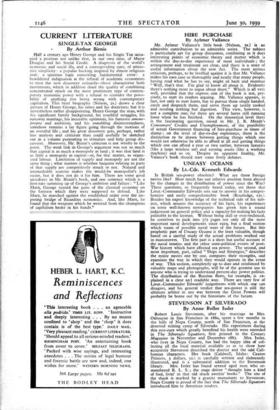UNEASY OCEANS By Lt.-Cdr. Kenneth Edwards
Is British sea-power obsolete? What are these foreign navies like? How much has our relative position been altered by the changes in the distribution of power since the War? These questions, so frequently heard today, are those that Lieut.-Commander Edwards sets out to answer in his compre- hensive and easily comprehensible book (Routledge, 15s.). Besides his expert knowledge of the technical side of his sub- ject, which assures the accuracy of his facts, his experiences on some well-known newspapers has given him a sound judgement on general policy and a capacity for making his facts palatable to the layman. Without being dull or over-technical, he contrives to pack into 372 pages not only all the most important naval developments since 1919, but a final section which treats of possible naval wars of the future. But this prophetic part of Uneasy Oceans is the least valuable, though based on a careful study of the actual problems worked out in manoeuvres. The first part is a short but useful account of the naval treaties and the other semi-political events of post- War history which have affected sea power. The second, and most important, part, called " Ships and Strategies," describes the major navies one by one, compares their strengths, and examines the way in which they would operate in the event of war. This section, completely up to date and reinforced by valuable maps and photographs, will be of the greatest use to anyone who is trying to understand present-day power politics. The distribution of the Russian fleets, for example, is ex- plained in a clear and readable way. There are very few of Lieut.-Commander Edwards' judgements with which one can disagree, and his general verdict that sea-power is still the ultimate arbiter in any war between the Great Powers will probably be borne out by the historians of the future.










































 Previous page
Previous page